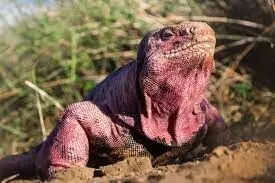
Critically endangered pink iguana hatchlings found in the Ecuadorian archipelago
text_fieldsThe pink iguanas may have a better future ahead as scientists discovered the hatchlings of the critically endangered species in the Ecuadorian archipelago. The reptiles are native to the Wolf Volcano in northern Isabel Island.
Experts think the juvenile population is a sign that the species can make a miraculous comeback from the brink of extinction. They are under threat by introduced species like rodents. Feral cats and black rats are known to steal iguana eggs and sometimes the young. The only native predator of the species is the Galapagos hawk.
With only several hundred left, the hatchlings are crucial for the species' survival. Director of the Galapagos National Park Danny Rueda said the discovery of the young population marks a "significant step forward." It allows experts to identify a path going forward to save the pink iguana.
"Knowing all the aspects that make their existence vulnerable will allow us to take timely actions, mainly against invasive species, and thus avoid interrupting the natural cycles of these fragile ecosystems," added the official.
The pink iguanas were first discovered by national park rangers in 1986. Scientists only recognised them as a separate species after decades. The Galapagos Islands have unique wildlife and are home to several species that are not found anywhere else. Some of them are giant tortoises, flightless cormorants, and several species of iguanas.
Experts have proposed a captive breeding programme for the pink iguana as there is a similar successful programme already established for some populations of the Galapagos land iguana.
























